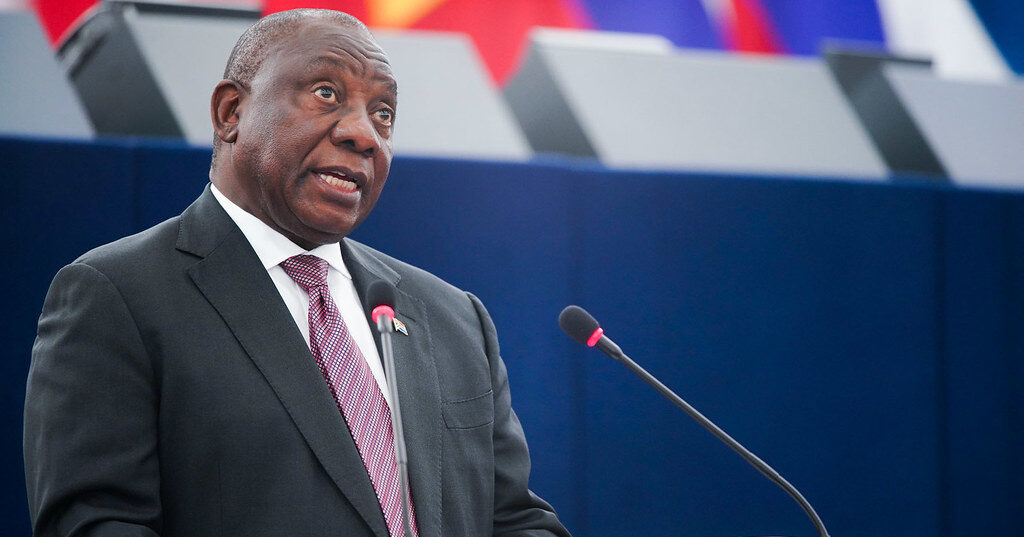

THE SEVENTH South African election under universal suffrage proved to be a turning point for the party that negotiated the ending of apartheid 30 years ago, the African National Congress (ANC). On 29 May, the ANC gained only 40% of the votes and 159 seats in the National Assembly, down from 58% and 230 seats. Its actual vote crashed from 10 million to 6.5 million.
But if that bombshell was expected, the ANC soon dropped another on 14 June. Spurning an alliance with former ANC prime minister Jacob Zuma’s uMkhonto weSizwe (MK) and former ANC youth leader Julius Malema’s Economic Freedom Fighters (EFF), which would have given the party a majority, Cyril Ramaphosa formed a coalition with the Democratic Alliance (DA).
The DA is made up of several apartheid-era white supremacist parties, most notably the Nationalist Party, which ruled over the Black majority with an iron fist for decades. It is the party of ‘white monopoly capital’ and the big white agribusiness landowners, with financial backing from Western multinationals. In provinces where it has been in office in coalitions, it has imposed vicious austerity on the poor and fiercely defended white farmers’ land ownership.
Grand coalition
Despite the bitter irony of the party which led the anti-apartheid struggle hooking up with the party of apartheid, there is a lot of common ground between them. Both are committed to neoliberalism – tax breaks for the rich, further privatisations, vicious cuts in social spending and clamping down on wages and trade union rights. Neither will alleviate the poverty and land hunger of millions of Black South Africans.
While South Africa did relatively well following the 2008 financial crisis, it has floundered since. GDP per capita is rock bottom, back where it was in 2005. The covid pandemic hit the country particularly hard, in large part due to the terrible state of public health facilities.
One third of the working population is unemployed, a rate rising to 50% among the youth. Inflation has been persistently running at 5-6%, nearer 20% for the poor who spend more on food and energy. Electricity and water supplies are routinely, almost daily, cut.
But there are deep divides as well. The DA will seek to clamp down on the excesses of Black Economic Empowerment, which has enriched a Black middle class and bourgeoisie (Ramaphosa himself is worth $450m). This will cause ructions in the ANC, especially with its influential pro-Zuma wing.
In foreign policy, too, the coalition partners face opposite ways. The ANC supports greater ties with China and Russia via the expansion of the BRICS as an alternative to the G20, World Bank and IMF. It refused to sanction Russia for its invasion of Ukraine and prosecuted Israel for genocide in Gaza. This of course will cause friction with the avowedly pro-Western DA. Supporters of MK and the EFF, as well as the still influential South African Communist Party (SACP), will fight hard to resist any break with the BRICS orientation.
The problems facing the South African working class stem from the Stalinist twostages strategy of first defending the ‘National Democratic Revolution’ through a ‘Liberation Alliance’ with the ANC and only much, much later fighting for socialism. SACP members and COSATU leaders still sit in the National Assembly as ANC delegates—after 30 years of betrayal and alongside the party of the enemy the popular front was designed to overthrow!
The immediate task facing revolutionaries in South Africa is to break the COSATU trade union federation from the ANC and force it to fight the government. Shop stewards and worker activists need to demand a fighting united front against the coming assault on the working class, which will increase with DA ministers chomping at the bit.
This will mean a struggle against the COSATU union bureaucracy, which has grown fat on its cosy relations with ministers. In particular, it will entail a rebuilding of shop steward power to demand not only a break with the ANC, but political strike action to bring down the Government of National Unity.
The South African working class needs its own party that openly calls for a second South African revolution. This time it should not only deal, once and for all, with the white capitalists’ control over finance, industry and the land, but also with capitalism itself, which, whether in its apartheid form or under the guise of Black Economic Empowerment, has robbed the working class of the fruits of its revolutionary struggles.